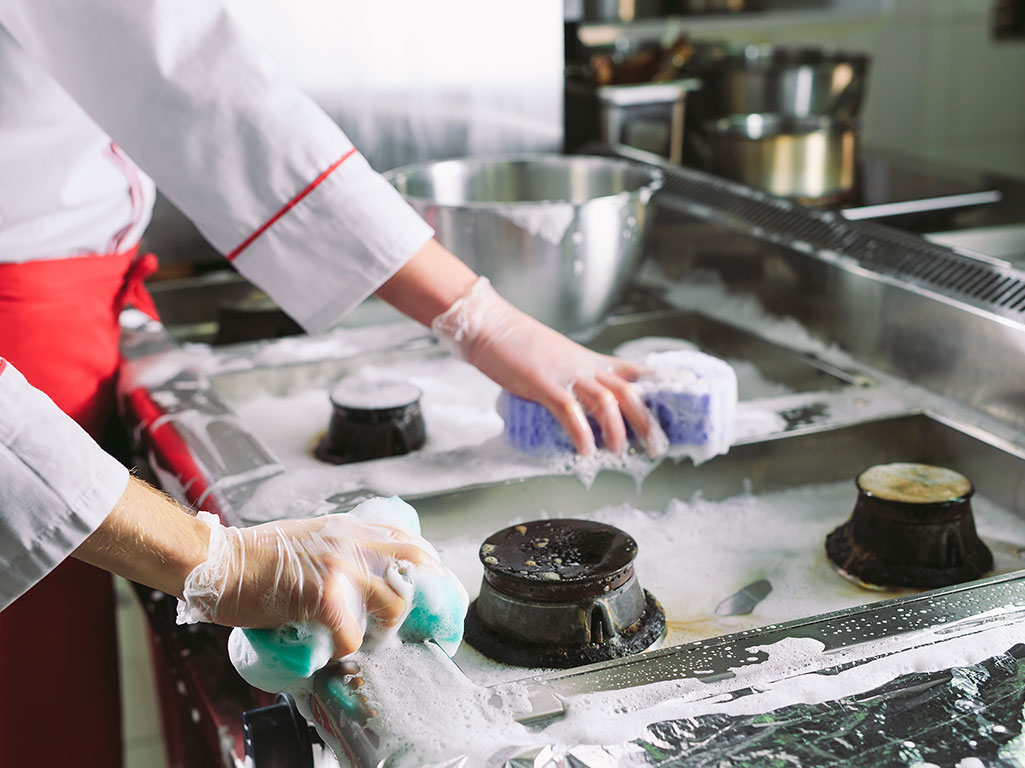Cleaning Commercial Kitchen Equipment
The success of a restaurant is not only determined by the quality of food and service, but also the general cleanliness (which means a primary task for employees will be to clean). Cleaning a restaurant is no easy job – there is a long list of tasks for employees to complete daily, weekly, and monthly.
Kitchens are a restaurant’s hotspot and are exposed to many risks. Proper maintenance and cleaning is critical to ensure the general safety of an establishment – a clean kitchen will eliminate the risk of potential fire hazards and health code violations.
In this article, we will dive into how to clean commercial kitchen equipment – everything from preparation surfaces to ventilation hoods.
Cleaning Commercial Kitchen Surfaces
Kitchen surfaces are used throughout the day to cut, chop, and prepare ingredients. Due to the frequent use, surfaces are prone to grow bacteria – so they need to be cleaned multiple times a day.
It only takes a few simple steps to clean kitchen surfaces. The first step is to clear off the surface by removing anything placed on top. Next, spray disinfectant spray about 8 to 12 inches away from the surface and wipe down with a soft cloth. For harder to remove spills and stains, use a soft brush and warm water.
Cleaning Kitchen Sinks
A commercial kitchen will have multiple sinks for handwashing, dishwashing, and food washing – all of which will be used daily. Regularly cleaning sinks will keep a sanitary kitchen, while also preventing buildup and clogged drains.
All of the kitchen sinks should be wiped down at the end of each day with a disinfectant spray – and don’t forget the backsplash and faucet! Other regular maintenance that should take place is deliming the sinks weekly and degreasing the drains monthly.

Cleaning Cooking Appliances
The appliances within a commercial kitchen will depend on the restaurant's menu – so there will be different cleaning requirements for each appliance. With that being said, when appliances are properly and regularly cleaned, they will remain in good condition and reduce the risk of fire (specifically caused by grease build up). Listed below are a few common appliances within a kitchen and their cleaning requirements.
Ventilation Hood: Wash the ventilation hoods according to instructions from the service manual. Don’t forget about the filters – and if there’s any rips or tears, replace them immediately!
Burners and Cooktops: Using disinfectant spray (or warm, soapy water), scrub down the parts and surfaces.
Grills: Soak the grates in warm, soapy water to remove ash and grime. Don’t forget to empty out the drip trays!
Fryers: Remove grime and stuck on food by boiling out the fryer with hot water and cleaning solution.
Cleaning Kitchen Floors and Walls
The floors and walls within a kitchen are a hotspot for food spills and grease buildup – which is a fire hazard and can trap foul odors, so it’s crucial they are properly cleaned. Floors need to be cleaned daily, while walls need to be cleaned weekly.
To clean kitchen floors, begin by sweeping or vacuuming to remove any food, dirt, and trash. Next, use a cleaning solution and a mop to wipe down the floors. For walls, use either a soft brush or cloth with a cleaning solution.
Conclusion - How Should Commercial Kitchen Equipment Be Cleaned?
There is a long list of tasks that will need to be regularly completed in order to maintain a clean and safe establishment. The kitchen is the heart of the restaurant, determining the flow and efficiency of operations – when designed properly, the restaurant will be easy to clean and can run smoothly.
Diversified Construction specializes in building and remodeling commercial kitchens, with over 60 years of business experience in the Twin Cities. Contact us today at 952-929-7233 if you’re looking to start a new project.

